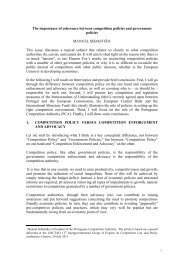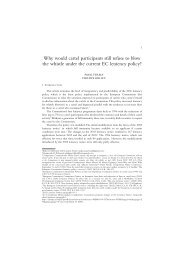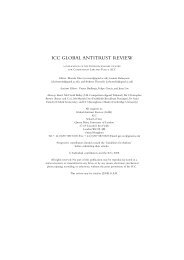GAR 2008 journal [PDF 1354 kb] - The Interdisciplinary Centre for ...
GAR 2008 journal [PDF 1354 kb] - The Interdisciplinary Centre for ...
GAR 2008 journal [PDF 1354 kb] - The Interdisciplinary Centre for ...
You also want an ePaper? Increase the reach of your titles
YUMPU automatically turns print PDFs into web optimized ePapers that Google loves.
24<br />
GLOBAL ANTITRUST REVIEW<br />
may, however, also have an economic impact. In Meca-Medina, anti-doping rules adopted by<br />
the International Olympic Committee were analysed in light of the competition rules:<br />
apparently endorsing a broad application of the ‘sporting exception’ from competition law and<br />
the free movement rules, the Court of First Instance (CFI) widely disregarded their potential<br />
economic repercussions. 61 On appeal, the ECJ repeated the established jurisprudence based<br />
upon the decision in Walrave. 62 As to the application of Wouters to the case at hand, the ECJ<br />
generally endorsed the application of Article 81 EC to the anti-doping rules, taken within the<br />
overall context of support <strong>for</strong> an anti-doping policy in sport. Rejecting an abstract assessment<br />
of the rules in question regarding their compatibility with the competition rules, and also<br />
rejecting the equation of a restriction on the freedom of action of the parties and a restriction<br />
of competition, it was to be considered ‘whether the consequential effects of the restriction of<br />
competition are inherent in the pursuit of those objectives (Wouters and Others, paragraph 97),<br />
and are proportionate to them.’ 63 <strong>The</strong> ECJ confirmed the Commission’s appreciation that the<br />
goal of the rules in combating doping <strong>for</strong> the fair conduction of competitive sport included<br />
the safeguard of equal chances <strong>for</strong> athletes, their health, and the integrity and objectivity of<br />
competitive sport and ethical values in sport.<br />
V. ARTICLE 81 EC:THE NOTION OF THE ‘UNDERTAKING’<br />
With regard to the scope of Article 81 EC ratione personae, the classic test has been established<br />
in the Höfner decision. According to the ECJ, the functional understanding of the term<br />
‘undertaking’ covers ‘every entity engaged in an economic activity, regardless of the legal status<br />
of the entity and the way in which it is financed.’ 64 This implies that the type of the activity<br />
per<strong>for</strong>med rather than the characteristics of the actors, which per<strong>for</strong>m it, is relevant.<br />
If an undertaking engages in an activity in the public interest, which <strong>for</strong>ms part of the<br />
essential functions of the state, it is not regarded as an undertaking within the meaning of<br />
Article 81 EC. 65 Regarding the criterion of solidarity and the degree of solidarity, which<br />
characterises many bodies related to social security, the only helpful conclusion resulting<br />
from the jurisprudence is that competition law does not apply where solidarity is<br />
predominant and the entities in question exercise an exclusively social function (Poucet,<br />
Cisal). 66 A social aim is not in itself sufficient to preclude the application of Article 81 EC.<br />
Under this heading, the Court has analysed the relationship between risk and contributions,<br />
and between the contributions and benefits within a certain scheme and across several<br />
schemes. Furthermore, the supervision of the activity of a certain body by the state has<br />
proven of particular importance. Moreover, cultural organisations and organisations<br />
operating in the area of public health are not sheltered from the personal scope of the<br />
competition rules. 67 Undertakings operating in the field of environmental protection are<br />
61<br />
For this reason criticising the judgment Weatherill, Anti-Doping Rules and EC Law, (2005) 26 European<br />
Competition Law Review, 7, 416-421.<br />
62<br />
ECJ, C-519/04 P, 2006 ECR Meca-Medina, paragraph 25f.<br />
63<br />
Ibid., paragraph 42.<br />
64<br />
ECJ, C-41/90, 1991 ECR I-0135 Höfner and Elser , paragraph 21.<br />
65<br />
ECJ, C-343/95, Diego Cali, paragraph 22f, regarding the task of anti-pollution surveillance exercised by a private<br />
undertaking holding an exclusive right. See also ECJ, C-364/92, SAT Fluggesellschaft v Eurocontrol, regarding an air<br />
traffic control organisation in charge of maintaining and improving air navigation safety.<br />
66<br />
ECJ, C-218/00, Cisal, paragraph 37f.; joined cases C-159/91 and 161/91, Poucet et Pistre; C-244/94 FFSA; joined<br />
cases 264/01, C-306/01; C-354/01 and C-355/01 AOK Bundesverband; cf. <strong>for</strong> an overview over the case law, De Vries,<br />
Tension within the Internal Market. <strong>The</strong> functioning of the internal market and the development of horizontal and flanking policies,<br />
2006, Groningen, 3;AG Poiares Maduro, C-205/03P, 2006 ECR I-6295, Federación Española de Empresas de Tecnología<br />
Sanitaria v Commission of the European Communities;Townley, C.,<strong>The</strong> Concept of an ‘Undertaking’:<strong>The</strong> Boundaries<br />
of the Corporation – a discussion of agency, employees and subsidiaries, in Amato, G., and Ehlermann, C-D. (eds.),<br />
EC Competition Law: a critical assessment (2007) Hart Publishing, Ox<strong>for</strong>d.<br />
67<br />
ECJ, C-155/73 Sacchi (Television undertakings fulfilling a task which concerned the public and which was of<br />
cultural and in<strong>for</strong>mative nature); joined cases, C-180/98 to 184/98, Pavlov (self-employed specialists in medical<br />
services), paragraph 76;


![GAR 2008 journal [PDF 1354 kb] - The Interdisciplinary Centre for ...](https://img.yumpu.com/36860029/34/500x640/gar-2008-journal-pdf-1354-kb-the-interdisciplinary-centre-for-.jpg)

![GAR 2009 journal [PDF 592kb] - The Interdisciplinary Centre for ...](https://img.yumpu.com/43872044/1/184x260/gar-2009-journal-pdf-592kb-the-interdisciplinary-centre-for-.jpg?quality=85)
![Law, markets and globalization (David J Gerber) [PDF 371kb] - The ...](https://img.yumpu.com/35387890/1/184x260/law-markets-and-globalization-david-j-gerber-pdf-371kb-the-.jpg?quality=85)

